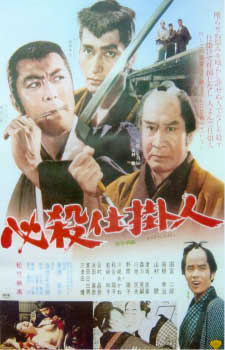Professional Killers (Hissatsu
Shikakenin)

Director: Yusuke Watanabe
Year: 1973
Production Company: Shochiku
Running Time: 90 minutes
Not too long ago I came across a pair of books called “Master Assassin”
and “Bridge of Darkness” by Shotaro Ikenami. The books are a series of short
stories about a doctor during the Edo period who uses his acupuncturist skills
to both cure and kill. Dr. Baian is essentially a good man who accepts the
money he receives for killing the bad so that he can heal the sick who can’t
afford it. These are terrific well-written stories that authentically detail
the life during these times and patiently unroll these stories to good effect.
These stories are street level and often take place in the bars and brothels
of Edo and Baian is a happy purveyor of this scene.

I thought at the time that these would be a perfect subject for a film and
now to my surprise I discover that not only have a number of films been produced
about this character but that it was also the subject of a long running TV
show of over 1,000 episodes! Think about that. And realize that the subject
matter concerns a protagonist and hero who kills people for a living. Of
course, the U.S. had “Have Gun Will Travel” in the 1950’s but somehow I doubt
if it’s quite the same thing. A number of the TV shows are available I noticed
on DVD but as one would expect without subtitles. The star of that was Ken
Ogata but in the first theatrical film Shochiku chose a different actor to
portray the good doctor.

Much of this film was adapted from Shotaro’s story “Two Wives” though a good
deal more is added to fill the movie out. The short stories tend to be Hemingway
like in their clean prose and simplicity with the actual killing being a
mere exclamation point in the narrative. It’s all the context around the
killing that make them so enjoyable – Baian’s friendships, his pilgrimages
to cleanse his sins, his meals and his sexual interludes. The film is almost
too complicated for its own good and contains a side story of another assassin
that detracts more than it adds. Baian’s agent Otowaya (Tamio Kawaji) comes
to him with an offer to kill a woman. Baian (Jiro Tamiya) trusts Otowaya
to only bring him targets that deserve death and being an equal opportunity
killer he accepts the job. The woman is the wife of a wealthy merchant who
has married him for his wealth and is in the process of taking him for all
she can. Under a bright canopy of fully aroused cherry blossoms at a fair,
Baian pulls out a sharp needle and plunges it right below the back of her
skull and she doesn’t have time to utter a word or have a single regret before
she dies.

His next assignment comes soon after – this time a twofer. A wife and her
boyfriend have murdered her older husband and are trying to steal the father’s
business away from the son. At a hot spring Baian relates his past to a trusted
fellow assassin – when he was a mere child his father died and his mother
ran off with her lover and took Baian’s sister with her. Later he learned
that the mother had become a prostitute, but he has no idea where his sister
is anymore and wishes he could find her. He doesn’t have to look far – she
is the woman he has been contracted to kill. According to Weisser’s
“Japanese Cinema” (where the information came from about the TV series) this
film was a total flop and in the next installment they went back to using
Ogata. Part of that may simply have been the difficulty of the audience in
accepting a different actor playing Baian, but the film never really gets
any traction after the great opening credits which kick off with Baian watching
his next female victim have sex to a grand musical intro of Spanish trumpet
and guitar that would perhaps feel more at home in a Spaghetti western but
sounded great all the same.

My rating for this film: 6.0





